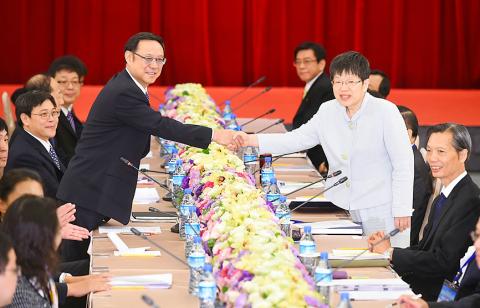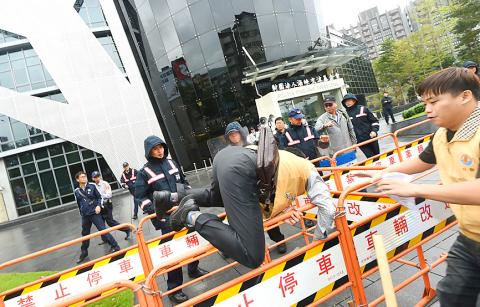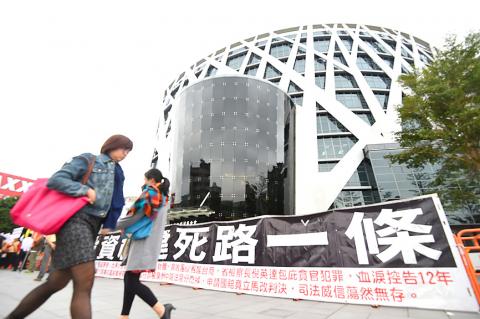China’s Association for Relations Across the Taiwan Straits (ARATS) Chairman Chen Deming (陳德銘) yesterday arrived in Taiwan for a seven-day visit.
Chen headed to the Taichung-based Tachia Chenlan Temple on arrival, which is dedicated to Matsu, goddess of the sea, a Straits Exchange Foundation (SEF) official said.
Chen is to visit Taipei, New Taipei City, Keelung, Yilan, Hsinchu, Miaoli and Nantou.

Photo: Chang Chia-ming, Taipei Times
The main purpose of the trip is to engage with Taiwanese in grassroots communities and promote cross-strait cultural, economic and trade policies, the official said.
Separately yesterday, a meeting was held with SEF Vice Chairman Shih Hui-fen (施惠芬) and ARATS Deputy Chairman Zheng Lizhong (鄭立中) to review the results of agreements signed by the two organizations.
At a press briefing in Taipei, Zheng denied that only large companies benefit from the pacts.

Photo: Chang Chia-ming, Taipei Times
“No trade or economic activities can create equal benefits for all people, but the overall economy can see spill-over effects, such as job creation and tax revenue growth,” he said.
When asked about actions taken by ARATS after the Chinese Communist Party’s Central Commission for Discipline Inspection, on Oct. 22 published a report on 15 government agencies and state-owned enterprises including the Taiwan Affairs Office (TAO), Zheng said that there was illegal solicitation of funding among organizations tasked with handling cross-strait affairs.
“Problems such as soliciting sponsorship do exist,” Zheng said.

Photo: Chang Chia-ming, Taipei Times
The report said the TAO is soft on officials that are found to have violated regulations and has poor supervision of organizations under its umbrella.

Alain Robert, known as the "French Spider-Man," praised Alex Honnold as exceptionally well-prepared after the US climber completed a free solo ascent of Taipei 101 yesterday. Robert said Honnold's ascent of the 508m-tall skyscraper in just more than one-and-a-half hours without using safety ropes or equipment was a remarkable achievement. "This is my life," he said in an interview conducted in French, adding that he liked the feeling of being "on the edge of danger." The 63-year-old Frenchman climbed Taipei 101 using ropes in December 2004, taking about four hours to reach the top. On a one-to-10 scale of difficulty, Robert said Taipei 101

Nipah virus infection is to be officially listed as a category 5 notifiable infectious disease in Taiwan in March, while clinical treatment guidelines are being formulated, the Centers for Disease Control (CDC) said yesterday. With Nipah infections being reported in other countries and considering its relatively high fatality rate, the centers on Jan. 16 announced that it would be listed as a notifiable infectious disease to bolster the nation’s systematic early warning system and increase public awareness, the CDC said. Bangladesh reported four fatal cases last year in separate districts, with three linked to raw date palm sap consumption, CDC Epidemic Intelligence

Two Taiwanese prosecutors were questioned by Chinese security personnel at their hotel during a trip to China’s Henan Province this month, the Mainland Affairs Council (MAC) said yesterday. The officers had personal information on the prosecutors, including “when they were assigned to their posts, their work locations and job titles,” MAC Deputy Minister and spokesman Liang Wen-chieh (梁文傑) said. On top of asking about their agencies and positions, the officers also questioned the prosecutors about the Cross-Strait Joint Crime-Fighting and Judicial Mutual Assistance Agreement, a pact that serves as the framework for Taiwan-China cooperation on combating crime and providing judicial assistance, Liang

US climber Alex Honnold left Taiwan this morning a day after completing a free-solo ascent of Taipei 101, a feat that drew cheers from onlookers and gained widespread international attention. Honnold yesterday scaled the 101-story skyscraper without a rope or safety harness. The climb — the highest urban free-solo ascent ever attempted — took just more than 90 minutes and was streamed live on Netflix. It was covered by major international news outlets including CNN, the New York Times, the Guardian and the Wall Street Journal. As Honnold prepared to leave Taiwan today, he attracted a crowd when he and his wife, Sanni,